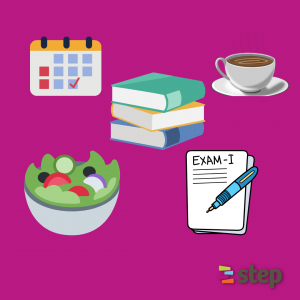Three Top Tips for Managing your time during Exam Season
As exams approach, students can feel overwhelmed by the amount of material they need to review. It can be difficult to know where to start, or how to use your time in the most effective way. Time management is key during exam season.
By creating a study plan and schedule, you can ensure that you are making the most of your time and covering all the material you need to know. You may also want to consider studying in shorter bursts, with regular breaks in between. This can help you to avoid feeling overwhelmed and stressed. Remember, it is also important to take care of yourself during this time. Make sure to get enough sleep and exercise, and eat healthy meals. By taking care of your body and mind, you will be in the best possible position to do well on your exams.
Let’s take a closer look at this advice:
1. Make a study schedule and stick to it
When it comes to preparing for exams, students often have a lot of information to study and review. This can make it difficult to know where to start, or how to use their time efficiently. One way to make studying more manageable and effective is to create a study schedule.
A study schedule can help students by providing a structure and timeline for their studying. It can also help them to break down large tasks into smaller, more manageable pieces.
Creating the plan may take some time upfront, but it can save students a lot of stress in the long run. By taking the time to create a plan and schedule out their studying, students can increase their chances of success on exams.

To create an effective study schedule, you first need to assess your current situation and make an honest evaluation of what you can realistically accomplish each day. From there, you should plan ahead by determining how much time each task will take and when deadlines are due.
If possible, try to set up your schedule in advance so that it is ready to go when the exam period begins. And remember to be realistic about your limits – if you know that a certain night will be packed with extra-curricular activities, pencil in some extra time for studying on another day instead.
2. Take breaks
Studying for exams can be both mentally and physically exhausting. It takes a lot of time and focus to absorb new information, keep track of details, and retain that knowledge in the weeks leading up to your exams. It is critical to take regular breaks while preparing for your exams.
Many students don’t realise that taking breaks is actually an important part of the studying process. When we study for long periods of time, our brains become overloaded and we start to lose focus. Taking a break allows us to step away from the material and come back refreshed and ready to learn. So next time you’re feeling overwhelmed by your studies, remember that it’s okay to take a break.
Breaks help to rejuvenate your brain so that you can continue studying effectively, while also reducing feelings of stress or anxiety during this stressful time. In addition, rest and relaxation are essential for overall physical health, ensuring that you’re able to make it through each day feeling refreshed and energised.
3. Prioritise your own health and wellbeing
As most of us know, exam season can be a stressful time for students. With so much pressure to perform well and study intensely, it is easy for our health and wellbeing to take a backseat. However, this is exactly the wrong approach to take during exam season.
For one thing, taking care of ourselves helps ensure that we are performing at our best, both mentally and physically. Additionally, good health and wellbeing are important foundations for academic success. By prioritising things like good nutrition, sufficient sleep, and regular exercise during exam season, we can better focus on the important task at hand while still taking care of ourselves in the process. In summary, you should:
○ Get some exercise – you’ll work better when you’re refreshed
○ Get enough sleep – you won’t be able to focus if you’re exhausted
○ Eat healthy foods so your brain has the energy it needs to function properly